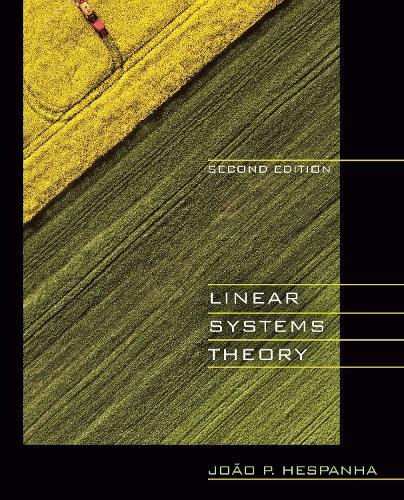Overview
A fully updated textbook on linear systems theoryLinear systems theory is the cornerstone of control theory and a well-established discipline that focuses on linear differential equations from the perspective of control and estimation. This updated second edition of Linear Systems Theory covers the subject's key topics in a unique lecture-style format, making the book easy to use for instructors and students. Joao Hespanha looks at system representation, stability, controllability and state feedback, observability and state estimation, and realization theory. He provides the background for advanced modern control design techniques and feedback linearization and examines advanced foundational topics, such as multivariable poles and zeros and LQG/LQR. The textbook presents only the most essential mathematical derivations and places comments, discussion, and terminology in sidebars so that readers can follow the core material easily and without distraction. Annotated proofs with sidebars explain the techniques of proof construction, including contradiction, contraposition, cycles of implications to prove equivalence, and the difference between necessity and sufficiency. Annotated theoretical developments also use sidebars to discuss relevant commands available in MATLAB, allowing students to understand these tools. This second edition contains a large number of new practice exercises with solutions. Based on typical problems, these exercises guide students to succinct and precise answers, helping to clarify issues and consolidate knowledge. The book's balanced chapters can each be covered in approximately two hours of lecture time, simplifying course planning and student review. Easy-to-use textbook in unique lecture-style formatSidebars explain topics in further detailAnnotated proofs and discussions of MATLAB commandsBalanced chapters can each be taught in two hours of course lectureNew practice exercises with solutions included
Full Product Details
Author: João P. Hespanha
Publisher: Princeton University Press
Imprint: Princeton University Press
Edition: Second Edition
Weight: 0.964kg
ISBN: 9780691179575
ISBN 10: 0691179573
Pages: 352
Publication Date: 13 February 2018
Audience:
College/higher education
,
Professional and scholarly
,
Tertiary & Higher Education
,
Professional & Vocational
Format: Hardback
Publisher's Status: Active
Availability: Manufactured on demand

We will order this item for you from a manufactured on demand supplier.
Language: English
Reviews
Praise for the previous edition: Linear Systems Theory gives a good presentation of the main topics on linear systems as well as more advanced topics related to controller design. The scholarship is sound and the book is very well written and readable. ---Ian Petersen, University of New South Wales, Praise for the previous edition: This book provides a sound basis for an excellent course on linear systems theory. It covers a breadth of material in a fast-paced and mathematically focused way. It can be used by students wishing to specialize in this subject, as well as by those interested in this topic generally. ---Geir E. Dullerud, University of Illinois, Urbana-Champaign, Praise for the previous edition: This is a splendidly written textbook; in fact, the next time I teach linear systems theory, I intend to use it. It covers the right amount of theory and presents the material at a perfect level for students. It has many exercises, most of which are well suited for beginning engineering graduate students. --Alan J. Laub, SIAM Review
"""Praise for the previous edition: ""Linear Systems Theory gives a good presentation of the main topics on linear systems as well as more advanced topics related to controller design. The scholarship is sound and the book is very well written and readable.""""---Ian Petersen, University of New South Wales ""Praise for the previous edition: ""This book provides a sound basis for an excellent course on linear systems theory. It covers a breadth of material in a fast-paced and mathematically focused way. It can be used by students wishing to specialize in this subject, as well as by those interested in this topic generally.""""---Geir E. Dullerud, University of Illinois, Urbana-Champaign"
Praise for the previous edition: This book provides a sound basis for an excellent course on linear systems theory. It covers a breadth of material in a fast-paced and mathematically focused way. It can be used by students wishing to specialize in this subject, as well as by those interested in this topic generally. ---Geir E. Dullerud, University of Illinois, Urbana-Champaign, Praise for the previous edition: Linear Systems Theory gives a good presentation of the main topics on linear systems as well as more advanced topics related to controller design. The scholarship is sound and the book is very well written and readable. ---Ian Petersen, University of New South Wales, Praise for the previous edition: This is a splendidly written textbook; in fact, the next time I teach linear systems theory, I intend to use it. It covers the right amount of theory and presents the material at a perfect level for students. It has many exercises, most of which are well suited for beginning engineering graduate students. --Alan J. Laub, SIAM Review
Praise for the previous edition: This book provides a sound basis for an excellent course on linear systems theory. It covers a breadth of material in a fast-paced and mathematically focused way. It can be used by students wishing to specialize in this subject, as well as by those interested in this topic generally. --Geir E. Dullerud, University of Illinois, Urbana-Champaign Praise for the previous edition: Linear Systems Theory gives a good presentation of the main topics on linear systems as well as more advanced topics related to controller design. The scholarship is sound and the book is very well written and readable. --Ian Petersen, University of New South Wales
Author Information
Joo P. Hespanha is professor of electrical engineering in the Center for Control, Dynamical Systems and Computation at the University of California, Santa Barbara. He is the author of Noncooperative Game Theory (Princeton).



